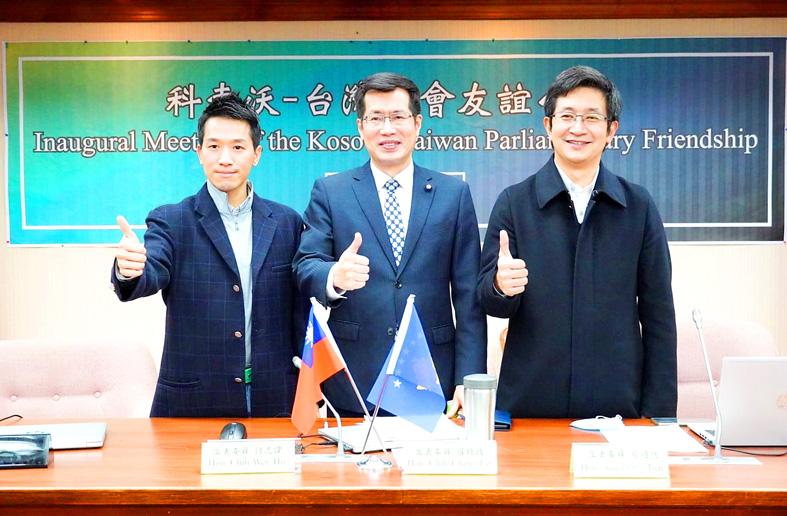A Taiwanese legislative friendship group aimed at building closer ties with Kosovo on Monday was formed during a videoconference with the Kosovo-Taiwan Parliamentary Friendship Group, which was established at the same time.
The Taiwanese group, which is made up of 39 lawmakers from across party lines, was assembled by Democratic Progressive Party (DPP) Legislator Lo Chih-cheng (羅致政), who is chairman of the group, while DPP Legislator Ho Chih-wei (何志偉) is the vice chairman, Lo’s office said in a statement.
The Kosovar Assembly’s Committee on Foreign Affairs and Diaspora on June 15 approved a motion to establish a parliamentary group to develop ties with Taiwan.

Photo: screen grab from Facebook
The motion was proposed by five Kosovar lawmakers from across the political spectrum, including Adriana Matoshi of the ruling Levizja Vetevendosje party.
Lo then contacted the five lawmakers and they established the two parliamentary friendship groups to increase legislative exchanges, improve mutual understanding and expand the two nations’ international space, Lo’s office said.
Hailing the establishment of the legislature’s first parliamentary friendship group with a Balkan nation, Lo said that the videoconference was a major step in the development of relations between lawmakers in Taiwan and Kosovo.
The two nations have many things in common, such as the pursuit of sovereignty and democratic values, and both are struggling for economic survival and international recognition, he said.
When Kosovo declared independence from Serbia in 2008, Taiwan was among a handful of nations that immediately recognized its independence, he added.
Matoshi, who leads the Kosovo-Taiwan Parliamentary Friendship Group, did not attend the videoconference as she was in hospital, but several members of the group were present, including Blerta Deliu-Kodra of the Democratic Party of Kosovo, who is vice chairwoman of the group.
Deliu-Kodra said during the videoconference that there was plenty of room to expand exchanges between Taiwan and Kosovo, and that the establishment of the groups marked an important stage in the development of bilateral relations.
Most importantly, Taiwan and Kosovo, as two democratic nations, would fight against authoritarianism side by side, Deliu-Kodra said.
During the videoconference, the two groups agreed to conduct parliamentary exchanges, and facilitate economic cooperation and people-to-people exchanges.
They also welcomed visits by group members next year, a statement said.

INVESTIGATION: The case is the latest instance of a DPP figure being implicated in an espionage network accused of allegedly leaking information to Chinese intelligence Democratic Progressive Party (DPP) member Ho Jen-chieh (何仁傑) was detained and held incommunicado yesterday on suspicion of spying for China during his tenure as assistant to then-minister of foreign affairs Joseph Wu (吳釗燮). The Taipei District Prosecutors’ Office said Ho was implicated during its investigation into alleged spying activities by former Presidential Office consultant Wu Shang-yu (吳尚雨). Prosecutors said there is reason to believe Ho breached the National Security Act (國家安全法) by leaking classified Ministry of Foreign Affairs information to Chinese intelligence. Following interrogation, prosecutors petitioned the Taipei District Court to detain Ho, citing concerns over potential collusion or tampering of evidence. The

Seventy percent of middle and elementary schools now conduct English classes entirely in English, the Ministry of Education said, as it encourages schools nationwide to adopt this practice Minister of Education (MOE) Cheng Ying-yao (鄭英耀) is scheduled to present a report on the government’s bilingual education policy to the Legislative Yuan’s Education and Culture Committee today. The report would outline strategies aimed at expanding access to education, reducing regional disparities and improving talent cultivation. Implementation of bilingual education policies has varied across local governments, occasionally drawing public criticism. For example, some schools have required teachers of non-English subjects to pass English proficiency

‘FORM OF PROTEST’: The German Institute Taipei said it was ‘shocked’ to see Nazi symbolism used in connection with political aims as it condemned the incident Sung Chien-liang (宋建樑), who led efforts to recall Democratic Progressive Party (DPP) Legislator Lee Kun-cheng (李坤城), was released on bail of NT$80,000 yesterday amid an outcry over a Nazi armband he wore to questioning the night before. Sung arrived at the New Taipei City District Prosecutors’ Office for questioning in a recall petition forgery case on Tuesday night wearing a red armband bearing a swastika, carrying a copy of Adolf Hitler’s Mein Kampf and giving a Nazi salute. Sung left the building at 1:15am without the armband and apparently covering the book with a coat. This is a serious international scandal and Chinese

TRADE: The premier pledged safeguards on ‘Made in Taiwan’ labeling, anti-dumping measures and stricter export controls to strengthen its position in trade talks Products labeled “made in Taiwan” must be genuinely made in Taiwan, Premier Cho Jung-tai (卓榮泰) said yesterday, vowing to enforce strict safeguards against “origin laundering” and initiate anti-dumping investigations to prevent China dumping its products in Taiwan. Cho made the remarks in a discussion session with representatives from industries in Kaohsiung. In response to the US government’s recent announcement of “reciprocal” tariffs on its trading partners, President William Lai (賴清德) and Cho last week began a series of consultations with industry leaders nationwide to gather feedback and address concerns. Taiwanese and US officials held a videoconference on Friday evening to discuss the